The Conservation Costs of Shutdowns
Air Date: Week of January 11, 2019
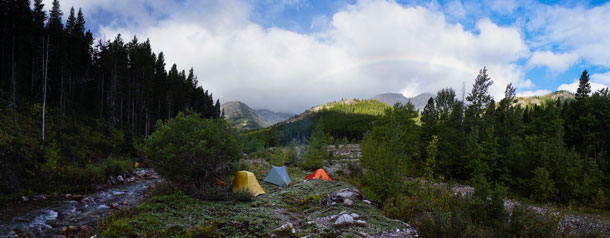
The Bob Marshall Wilderness Area in Montana is overseen by the U.S. Forest Service under the Department of Agriculture. (Photo: Troy Smith, Flickr, CC BY-NC-ND 2.0)
The government shutdown during the Trump administration began on December 22nd, 2018. In the ensuing weeks, concerns have grown about impacts on the nation’s public lands from the National Mall to Joshua Tree National Park. The facilities are critically understaffed when furloughed employees stay home. Problems include overflowing trash cans, illegal off-roading, poaching of animals and plants, and theft of artifacts as well as safety risks for park visitors. Former Secretary of the Interior Sally Jewell joins Host Steve Curwood to discuss how our national parks, forests, and other federal public lands have been affected by shutdowns.
Transcript
CURWOOD: It’s Living on Earth, I’m Steve Curwood.
When the United States government began a partial shutdown on December 22nd after the Republican Congress and President Trump could not agree on funding for a southern border wall, many national parks were left open without adequate personnel. The results have been disastrous and even fatal for some park patrons, according to Sally Jewell who served as Secretary of the Interior during the Obama administration. And even though trash piled up in the parks the Trump Administration kept paying many Interior Department officials who deal with oil and gas and are expediting the plans to drill in the Arctic National Wildlife Refuge. Sally Jewell is currently a Distinguished Fellow in the College of the Environment at the University of Washington and joins us now. Thank you for taking the time to be with us today, Sally!
JEWELL: It's my pleasure. Thanks for having me, Steve.
CURWOOD: So, Madam Secretary, in the past, national parks have been close to the public during government shutdowns. But during this most recent confrontation, the current administration chose to keep the parks open. How wise was that decision to keep them open?
JEWELL: Well, I think it was an incredibly unwise decision, having the doors to the parks open, but with a limited number of people puts those resources and the people that visit them at risk.
CURWOOD: And I gather, a number of people have died.
JEWELL: Yeah, my understanding was, the last count was seven. I will say that's not surprising, and I wouldn't be surprised if the number continues to go up. The reality is, people can hurt themselves in parks. And much of what happens with the rangers who are not on staff is closing trails, where there are additional risks is advising visitors and helping them understand the risks they face. And when somebody does have a circumstance that impacts them, it's launching a search and rescue operation. Those people that do search and rescue are many different people within the Park Service, not just law enforcement, and the fact that they're all furloughed would make it very difficult for people to respond in the case of an emergency, and, therefore, the risks would increase.
CURWOOD: Now, I believe there are a total of 59 national parks, but the department you ran the Interior Department and the Park Service is responsible for many more facilities - national monuments, National Historic Places, over 400 or something?
JEWELL: Yeah, over 400 units of the National Park Service and, and some are large national monuments that are designated monuments, some are called parks, some are historic buildings and structures. So, it's a wide variety of our nation's treasures, whether they be historic, cultural, or natural treasures.
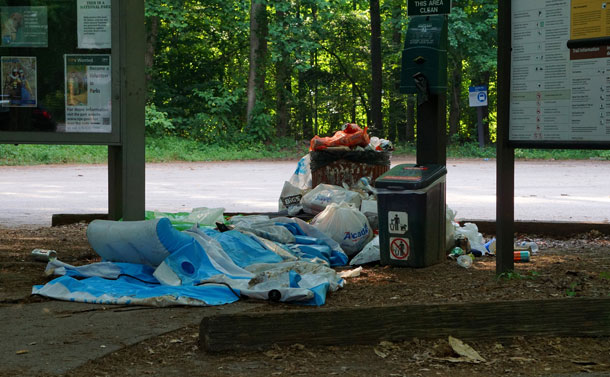
During the 2018-2019 shutdown trash piled up in National Parks. (Photo: Steve Harwood, Flickr, CC BY-NC 2.0)
CURWOOD: And under the Trump administration, then under the shutdown, these places are simply left open, really, without supervision.
JEWELL: Oh, that's true for a lot of them. But the historic buildings, for example, are locked as I understand it, but places like the National Mall, which is sort of the front door, if you will, to our nation's capital are open, but with very limited staff, and no restrooms. And, of course, we've all seen pictures of garbage piling up. But more importantly, it puts those assets that remind us of our history and our past in a vulnerable position to vandalism, souvenir taking and bad action. And the number of law enforcement people that are on staff can't possibly be the eyes and ears that the National Mall or other parks need to make sure that these places are protected.
CURWOOD: Sally Jewell, of course, you ran the Department of Interior, but there are a lot of conservation places that are under the Department of Agriculture. The National Forest system, for example, thinking of the Bob Marshall wilderness, which is a place that you can't even get to in an automobile. You have to either walk or take a horse. How are those places doing under the Trump administration's decision not to supervise places like that?
JEWELL: Well, they are in a very similar situation to the national parks, people are going into the backcountry in places that are overseen by the US Forest Service. The campgrounds are not getting service, the restrooms aren't getting cleaned, people will get lost on the trails, you have dogs going off leash in areas where that's not allowed, which impact wildlife. So, really, it's very much the same situation for the US Forest Service as it is for the National Park Service and the Bureau of Land Management and any other agencies that oversee public lands. They all have vulnerabilities and they're all being impacted.
CURWOOD: During the shutdown, a number of facilities move to have some people there anyway, using funds. I gather, these are coming from entrance fee funds. How is that possible? How legal even is that?
JEWELL: Well, when I was at Interior, it was very clear that our legal counsel of the solicitor's office, and the Justice Department felt that that was not an appropriate use or illegal use of those funds. What that does is it takes those visitor services fees from the things they were intended for, like deferred maintenance, like bringing in outside resources to supplement the operational resources of the park. So, I don't think it's an appropriate use. And neither is it a sustainable use of those funds. They should be used for their intended purpose.
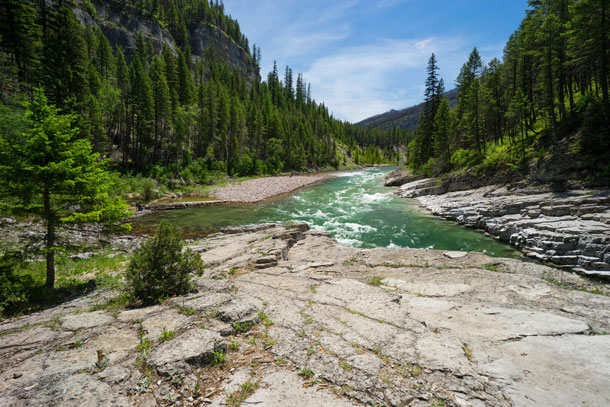
The Bob Marshall Wilderness Area in Montana is overseen by the U.S. Forest Service under the Department of Agriculture, which was subject to the 2018-2019 federal government shutdown. (Photo: Troy Smith, Flickr, CC BY-NC-ND 2.0)
CURWOOD: You devoted a lot of your career to taking care of the outdoors and conservation. How do you feel about the shutdown on its impact on our National Conservation system?
JEWELL: I am very, very worried about the long-term impacts of the shutdown from so many different angles. First, the National Park Service was created, and I'll quote directly from the Organic Act: “to conserve the scenery and the natural and historic objects and the wildlife therein, and to provide for the enjoyment of the same and such manner and by such means as will leave them unimpaired for the enjoyment of future generations.” When we have a government shutdown. Not only do we have increased risks to the assets the park is protecting, and the people that come and visit but we have a break in the data from the science that is very prevalent throughout the park, we have the disruption of visitor services, we have - and I know one of the hardest things I had to deal with was - people whose weddings were planned that had to be cancelled because they couldn't get into the park facility.
But I would say one of the biggest impacts of the shutdown that is long term is the impact on the employees, the morale, the fact that when they come back to work, they are faced with cleaning up this mess. Can you imagine you are a scientist and all of a sudden you're diverted with everybody else, to cleaning up human feces from the parking lots or all of the garbage that has blown into the sensitive natural areas that you're required to protect? And when your career has been around protecting these resources and understanding the impacts and removing invasive species and educating people that come and visit to come back multiple weeks later after a shutdown. And to be faced with both the visual and the olfactory and the deep, personal sense of offense you would feel when you walk there, it is just demoralizing. And we need people to want to be public servants, to be appreciated for being public servants. And that is hard to quantify, but very, very damaging with a shutdown of this nature and, frankly, of the shutdown that I experienced back in 2013 as well.
CURWOOD: When you ran the Interior Department, of course, you not only had the Park Service under you, you had Fish and Wildlife Service, you had the folks that handle the extraction of energy from public lands offshore and onshore. To what extent has this shut down put the regulation and care of energy extraction of oil drilling at risk? And to what extent does this damage the Fish and Wildlife Service ability to take care of things like endangered species and such?
JEWELL: When the Department of the Interior facilitates the development of resources on public lands like offshore oil and gas development, or mining or mineral development or wind energy or solar energy, it requires an understanding of the impact of those activities on the landscape and the partnership with the organization that's being permitted to do things in a safe and responsible way. When the government is shut down, the work, for example, on environmental impact statements is truncated, the Fish and Wildlife Service is a key partner of a number of other agencies as environmental impacts are being assessed. They are unable to be doing the evaluation of species that they need to. For example, Fish and Wildlife Service looks at migratory birds, migratory ungulates, are they, in fact, transiting this area during this specific period of time and how does that correlate to other years. They're losing not only the data associated with the shutdown period, but they are losing forever, the ability to correlate what that data would say, with the environmental conditions that might influence those species.
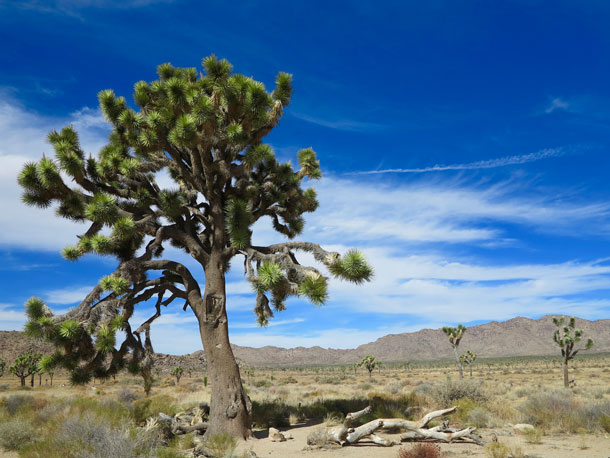
Joshua Tree National Park was temporarily closed to the public after sustaining damage during the 2018-2019 government shutdown. (Photo: Kyle Wicomb, Flickr, CC)
CURWOOD: So, what kinds of assets are risk in the national parks and monuments and such if people have access without regulation, without people to watch over them?
JEWELL: Without having appropriate controls, there is a risk that poachers will come and take some of those plants or animals and use them for their own purposes, which undermines that overall ecosystem and the sustainable use of those products within the ecosystems. You've got in some cases, like Joshua Tree, it's been reported where people have driven off-road vehicles on the sensitive cryptobiotic crust which will not recover, it will stay with those imprints of tires or footprints for hundreds of years. These are the kinds of things that people may or may not recognize, but there is damage that is being done right now.
CURWOOD: Then over National Forest side, hey, grab the chainsaw. Nobody's around.
JEWELL: That's right. One of the things that happen to Olympic National Park during the last shutdown is people poaching old growth trees right from the National Park. While there was law enforcement there, I mean, that's a couple million acres, there's no possible way that people can police something like that with limited capacity. This is, I'm sure, happening throughout our national forests and our national parks right now.
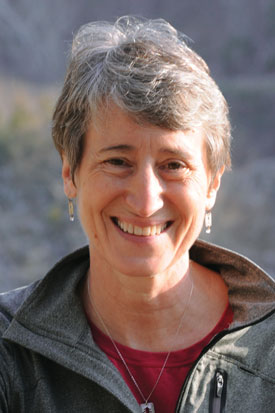
Sally Jewell is the United States' 51st Secretary of the Interior. (Photo: Courtesy of Washington University)
CURWOOD: A nightmare. Throughout the nation, there have been small groups of volunteers who tried to just step in and take out the trash in the national parks themselves. What do you think that says about the importance of our national parks, indeed, our natural resources to the public?
JEWELL: In the United States, we are unique in that the best places, the places that are the most spectacular, the most beautiful, with a richness of wildlife and wildlands that other countries don't have. We have set these lands and these special places aside for the benefit of all Americans. In other countries, oftentimes, they're owned by the nobility, or the kings and queens there in the private estate. In the United States, our best assets are in the public estate, and people love them as one of my predecessors, Dirk Kempthorne said, the national parks are not Republican national parks, or Democratic national parks. They are America's national parks. And that is true for so many of our public lands and our wildlands, people cared deeply and I saw this across the political spectrum about these places, they want to see them preserved and protected, not just for now, but for the generations to follow. And a shutdown like we have had under this administration, and the shutdown that I experienced during the Obama administration does so much to undermine both the public's ability to enjoy these resources. And the importance of the long-term protection of these resources, to have the parks open to have people running roughshod over them without the ability to appropriately care for them or interpret them is really a travesty for all of the American people who care so deeply about these special places.
CURWOOD: So, how you feeling?
JEWELL: I am feeling terrible about the shutdown. I'm really feeling sick about the message that it sends to the men and women who work for the federal government about their value. I'm sick about the impact on the science that we're not going to get back I am sick about the poaching that I know is going on the vandalism that I know is going on the artifacts that I know are being slipped into people's pockets, the work that would be done to help protect our forests from fires, the work that would be done to reduce the risk of invasive species, all of these things are put on hold. And all of that has long-term consequences for these places that we all own every one of us that are vulnerable if we're not there to care for them.
CURWOOD: Sally Jewell is the former Secretary of the Interior and currently a distinguished fellow, the College of the Environment at the University of Washington in Seattle. Thanks so much for taking the time with us today.
JEWELL: Thanks for the opportunity. Steve. It's been a pleasure.
Links
The New York Times “The Shutdown’s Lasting Damage to Joshua Tree”
National Parks Service’s official statement on keeping the National Parks open
Living on Earth wants to hear from you!
Living on Earth
62 Calef Highway, Suite 212
Lee, NH 03861
Telephone: 617-287-4121
E-mail: comments@loe.org
Newsletter [Click here]
Donate to Living on Earth!
Living on Earth is an independent media program and relies entirely on contributions from listeners and institutions supporting public service. Please donate now to preserve an independent environmental voice.
NewsletterLiving on Earth offers a weekly delivery of the show's rundown to your mailbox. Sign up for our newsletter today!
 Sailors For The Sea: Be the change you want to sea.
Sailors For The Sea: Be the change you want to sea.
 The Grantham Foundation for the Protection of the Environment: Committed to protecting and improving the health of the global environment.
The Grantham Foundation for the Protection of the Environment: Committed to protecting and improving the health of the global environment.
 Contribute to Living on Earth and receive, as our gift to you, an archival print of one of Mark Seth Lender's extraordinary wildlife photographs. Follow the link to see Mark's current collection of photographs.
Contribute to Living on Earth and receive, as our gift to you, an archival print of one of Mark Seth Lender's extraordinary wildlife photographs. Follow the link to see Mark's current collection of photographs.
 Buy a signed copy of Mark Seth Lender's book Smeagull the Seagull & support Living on Earth
Buy a signed copy of Mark Seth Lender's book Smeagull the Seagull & support Living on Earth

